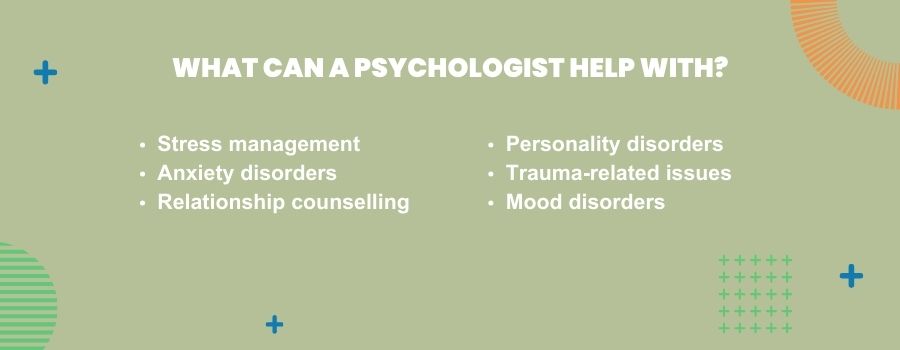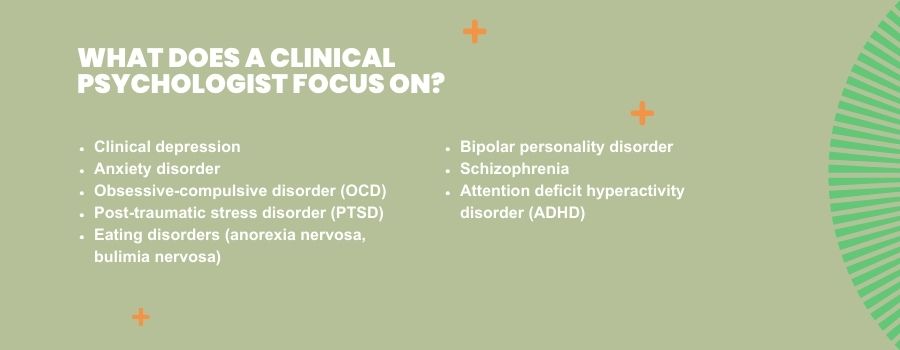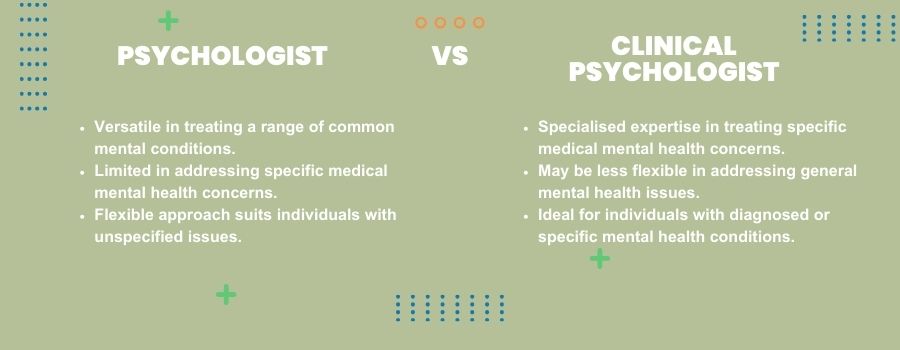The titles of a general ‘psychologist’ and ‘clinical psychologist’ are often used interchangeably due to the overlap in services offered – but there are some differences in the training they have received. In fact, while there is quite a lot of overlap between what the two can offer; knowing the difference between a registered psychologist and a clinical psychologist is essential in getting the right type of treatment for certain mental conditions.
To help clarify the distinctions between the two, we’ve provided an in-depth guide to help you understand the types of services offered by both, as well as the appropriate circumstances for attending treatment under a registered vs clinical psychologist.
What is a psychologist?
Also referred to as general psychologists, psychologists in Australia offer therapy and counselling treatment for a wide variety of personal and social issues for both individuals and groups.
In terms of qualifications, all psychologists in Australia will have completed a minimum of 4 years of university studies, followed by 2 years of supervised clinic work. Following study, psychologists must also meet the requirements of the Australia Board of Psychology in order to become registered and start practising.
Almost 60% of Australia’s mental health providers consist of general psychologists, making them one of the most readily accessible options for therapy.
What does a psychologist focus on?
True to the title of “general psychologist”, psychologists do not have any one specialisation. Instead, their expertise covers a wide range of issues from substance abuse and addiction to couples or family counselling. Other common areas psychologists often treat include:

- Stress management
- Anxiety disorders
- Relationship counselling
- Personality disorders
- Trauma-related issues
- Mood disorders
Do you need a referral to see a general psychologist?
No, there’s no need for a medical prescription or a referral to start attending therapy from a psychologist. Individuals or groups can book treatment appointments with psychologists at any time without needing to first visit a medical professional for a diagnosis.
What is a clinical psychologist?
Clinical psychologists are mental health professionals that have the same foundational training as general psychologists, with additionally having achieved a Master’s or Doctorate in Clinical Psychology.
As such, they are considered to have increased knowledge, exposure, and training in the treatment of clinical mental health conditions such as bipolar disorder or schizophrenia. This is the main difference between general and clinical psychologists.
Other than that, clinical psychologists are also qualified to treat the same range of conditions that general psychologists do.
What does a clinical psychologist specialise in?
The identification, diagnosis, and treatment of mental illnesses are what clinical psychologists specialise in. Examples of such mental conditions include:

- Clinical depression
- Anxiety disorder
- Obsessive-compulsive disorder (OCD)
- Post-traumatic stress disorder (PTSD)
- Eating disorders (anorexia nervosa, bulimia nervosa)
- Bipolar personality disorder
- Schizophrenia
- Attention deficit hyperactivity disorder (ADHD)
Clinical psychologists will have more targeted experience and knowledge of these mental illnesses compared to general psychologists, making them better suited to providing specific treatment in these areas.
Do you need a referral to see a clinical psychologist?
Just like with general psychologists, there is no need for any medical referral to be obtained before attending treatment with a clinical psychologist.
However, it’s important to note that clinical psychologists will not be able to prescribe nor provide medication as part of their treatment. Medication can only be dispensed by a medical professional such as a doctor or psychiatrist, which a clinical psychologist can provide a reference for.
Does Medicare cover a psychologist or clinical psychologist?
Yes, Medicare does cover the treatment cost of sessions with a general psychologist or clinical psychologist, but only under a mental health care plan that has been developed with a medical professional.
Furthermore, the subsidised coverage for a clinical psychologist is typically higher than that of a general psychologist due to the usually higher expenses of the former. Medicare coverage can provide subsidies for up to 10 sessions, with the potential for extension based on a case-by-case basis with a medical doctor’s recommendation.
Psychologist vs. clinical psychologist – which is right for me?
Despite the apparent difference in their levels of expertise in treating mental conditions, there’s no overall best option when comparing psychologists and clinical psychologists. Instead, the right choice for you will come down to the type of mental condition you are struggling with and your own personal circumstances.

Psychologists are more like Swiss army knives — they can treat a range of commonly encountered conditions and challenges but will be more limited when it comes to medical specific mental health concerns. This makes them more flexible and able to help individuals who don’t know what exactly is affecting them.
Clinical psychologists are better suited for individuals who already have an idea of the kind of mental illness that they are struggling with. Their ability to provide tailored treatment and solutions will provide more targeted benefits to these individuals.
At CFHP, our team of mental health providers consist of both general psychologists and clinical psychologists who come from a diverse range of cultures that can best relate to your circumstances. Our sessions are available in various languages such as Mandarin, Portuguese, Sinhalese, Italian, and more. Book an appointment with our experienced psychologists in Brisbane today to get effective treatment for you and your loved ones.




